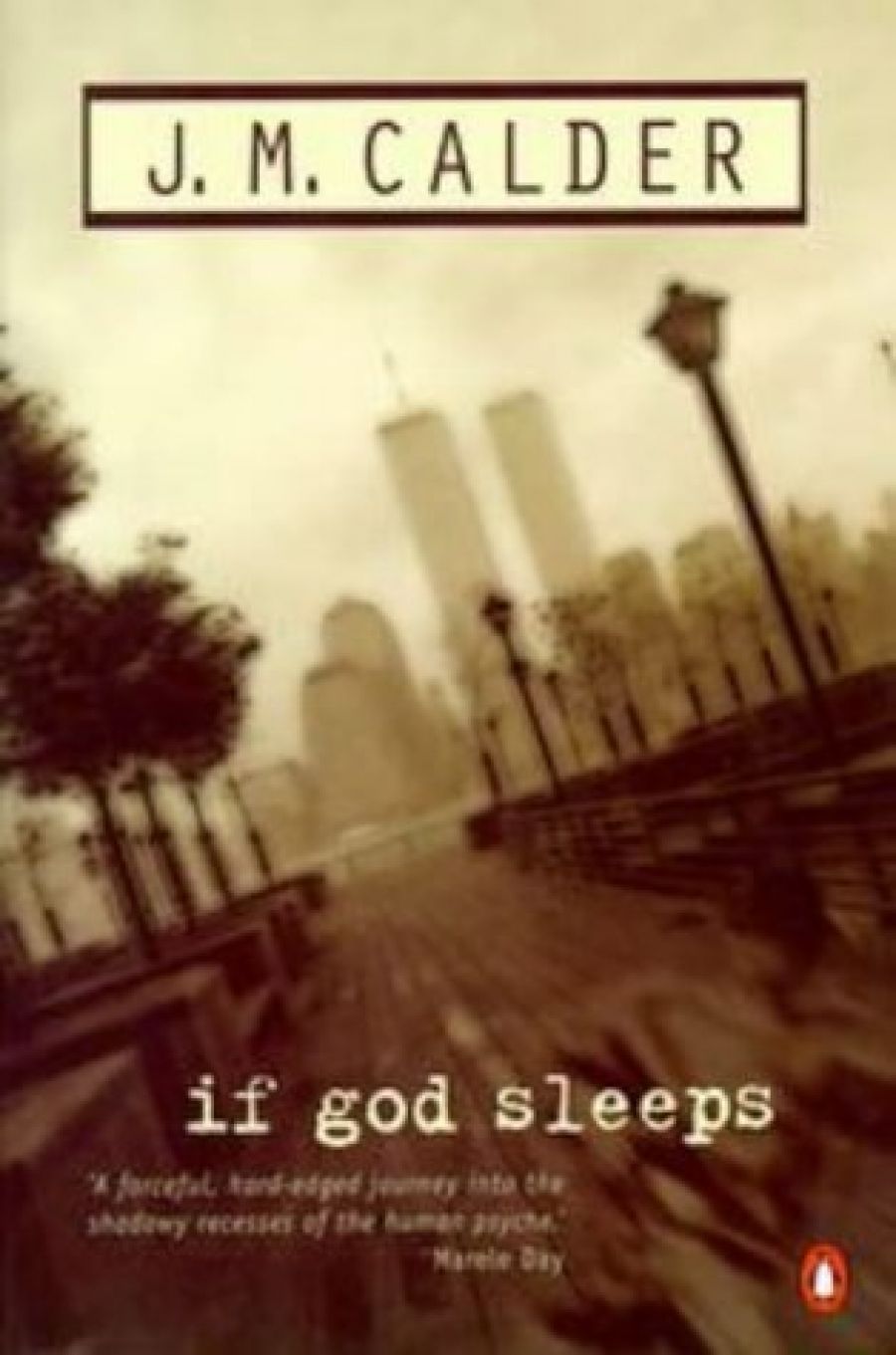
- Free Article: No
- Contents Category: Fiction
- Review Article: Yes
- Article Title: Who is J.M. Calder?
- Online Only: No
- Custom Highlight Text: Justice is traditionally depicted blindfolded – fair game, one might think, for those who would stack her scales. If God sleeps, who looks out for His little ones in a system that increasingly values property above the person, and expediency above all?
- Book 1 Title: If God Sleeps
- Book 1 Biblio: Penguin, $16.95pb, 357pp
Glass’s passion for justice, for fairness, is vested not in judges but in the person of Tuesday Reed, Deputy Public Prosecutor, an ice-maiden with arresting looks, a shaky marriage and the hint of vulnerability that is calculated to pierce Glass’s rock-like exterior. Reed’s devotion to her job and the rights of her clients is matched only by her disillusion with the system that she serves. She too has a young sidekick, the suspicious Sophie Corner, who seems to have been named solely to enable the throwaway ‘All roads now lead to Corner.’
The cases in which this cast of genre-typical characters are involved could have been culled from any recent newspaper: a thug holds up a late-night pizza bar with a sharpened screwdriver and turns a keen young casual into a paraplegic; a drug crazed intruder bashes a woman to death with her own poker; a five-year-old is run down by a fleeing Mafia enforcer. The sentences handed down are short; parole comes early; the judge preaches rehabilitation rather than retribution. Reed and Glass, despairingly seeking justice, are doubly sensitised by their own attendant spectres - screws in the soul which tighten with each judicial tap on the miscreant’s knuckles.
A similar anger and anguish-and a referral from Tuesday Reed - take one victim’s father to a group called Gabriel, a self-help therapy group, he believes, named for an angel guardian. His interest is slight, and slighting, until he is forced to realise that he’s got the wrong angel. This angel is of the avenging variety, and there are shocks in store not only for Ed Stevens and the reader (in whom suspicion has anyway been cultivated), but for poor besotted Solly Glass as well.
There are, indeed, a few too many angels in If God Sleeps ‘angel’ bodyguards for the local Mafia don, protective staff ‘angels’ for Tuesday Reed, good angels and ‘black’ angels - a host large and varied enough for over-exposure and confusion. There are also too many old jokes, which one would notice less if they were better ones. Solly’s relationship with his brother Isaac - a proxy Jewish moma - depends on a structured ‘yiddisher game’ in which it is Solly’s role never to laugh, a game which loses much of its point when the reader can see all too little to laugh at.
Jewish and Irish racial stereotypes seem integral to the novel, benign enough but still irritating. These are small flaws in a smooth and often seductive performance: this is, as the back cover blurb has it, ‘crime with style ... Fast, quirky, noir’ even if the style, quirks and blackness are quintessentially of the genre.
And now here’s a funny thing: the blurb finishes up ‘This is Calder’s best yet ...’ - self-defeatingly dreary routine praise in the world of serial thrillers - yet as far as one can tell, ‘Calder’ himself is a bandbox-new creation. What the book doesn’t tell us, but the press-release does, is that J.M. Calder is the collaborative voice of two award-winning Australian writers, John Clanchy and Mark Henshaw, whose exhilarating first novel Out of the Line of Fire was a cause celebre of almost Darvillian proportions in 1988 as opposing critics clashed swords over its literary standing. As one who found Out of the Line of Fire brilliantly stimulating, I have been awaiting more of Henshaw ‘ s work with impatience, though I can ‘t say that If God Sleeps is quite what I was expecting (and all the better for that, perhaps). Henshaw is currently living in New York and Clanchy in Canberra, so the book was drafted in Australia and revised and edited on the Internet.
So, is ‘Calder ‘s best yet’ carelessness on the part of the publisher, or caricature? In the context it is such a cliched commendation that one suspects the latter, which leads to the attendant possibility that the whole concept is parodic. Is this a case of Calder’s bluff? As parody, the novel paradoxically gains weight: the stereotypes become intentional and cleverly observed, the clenched-teeth style with its irregular and often inappropriate periods can be seen as guying the punchy delivery that is a favourite in popular fiction. Within the genre parody a more serious send-up lurks in the subtle exaggeration of judicial dereliction and its consequences - a send-up with a topical and cautionary point to make. Read ‘straight’, If God Sleeps is a flawed but compelling thriller; read as a parody of the hard-edged, the flaws fall into place and give us a work that is satisfyingly and thought-provokingly multi-layered.


Comments powered by CComment